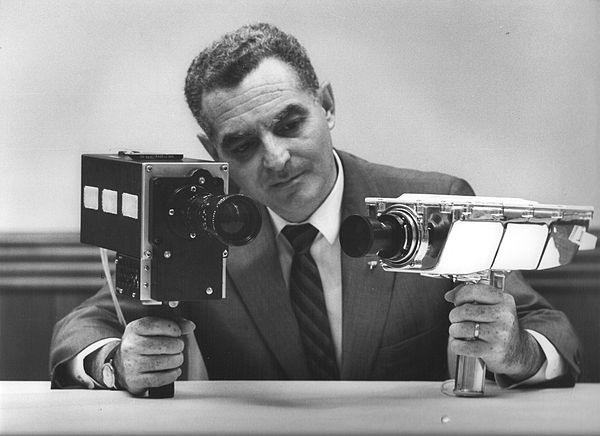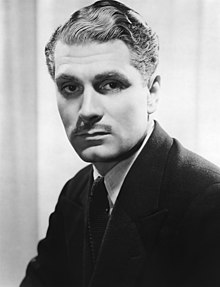Portal:Television
The Television Portal

Television (TV) is a telecommunication medium for transmitting moving images and sound. Additionally, the term can refer to a physical television set, rather than the medium of transmission. Television is a mass medium for advertising, entertainment, news, and sports. The medium is capable of more than "radio broadcasting", which refers to an audio signal sent to radio receivers.
Television became available in crude experimental forms in the 1920s, but only after several years of further development was the new technology marketed to consumers. After World War II, an improved form of black-and-white television broadcasting became popular in the United Kingdom and the United States, and television sets became commonplace in homes, businesses, and institutions. During the 1950s, television was the primary medium for influencing public opinion. In the mid-1960s, color broadcasting was introduced in the U.S. and most other developed countries.
In 2013, 79% of the world's households owned a television set. The replacement of earlier cathode-ray tube (CRT) screen displays with compact, energy-efficient, flat-panel alternative technologies such as LCDs (both fluorescent-backlit and LED), OLED displays, and plasma displays was a hardware revolution that began with computer monitors in the late 1990s. Most television sets sold in the 2000s were flat-panel, mainly LEDs. Major manufacturers announced the discontinuation of CRT, Digital Light Processing (DLP), plasma, and even fluorescent-backlit LCDs by the mid-2010s. LEDs are being gradually replaced by OLEDs. Also, major manufacturers have started increasingly producing smart TVs in the mid-2010s. Smart TVs with integrated Internet and Web 2.0 functions became the dominant form of television by the late 2010s. (Full article...)
Selected article -
"Abyssinia, Henry" is the 72nd episode of the M*A*S*H television series and the final episode of the series' third season. It was written by Everett Greenbaum and Jim Fritzell, and it first aired on March 18, 1975. The episode is notable for its shocking ending, in which the unit's amiable commanding officer Lieutenant Colonel Henry Blake (played by McLean Stevenson) receives an honorable discharge and leaves for home but, in the final scene, is reported killed by enemy fire. This ending prompted more than 1,000 letters to series producers Gene Reynolds and Larry Gelbart, and drew fire from both CBS and 20th Century Fox.
The title of the episode refers to the 1920s–1930s slang use of "Abyssinia" for "goodbye". ("Abyssinia", pronounced "ab-ee-SIN-ee-ah" can be understood as "I'll be seeing you".)
Selected image -

The Apollo TV camera refers to several television cameras used in the Apollo program's space missions, and on the later Skylab and Apollo-Soyuz Test Project missions, in the late 1960s and 1970s. These cameras varied in design, with image quality improving significantly with each successive model. Two companies made these various camera systems: RCA and Westinghouse. Originally, these slow-scan television (SSTV) cameras, running at 10 frames-per-second (fps), produced only black-and-white pictures and first flew on the Apollo 7 mission in October 1968. A color camera — using a field-sequential color system — flew on the Apollo 10 mission in May 1969, and every mission after that. The Color Camera ran at the North American standard 30 fps. The cameras all used image pickup tubes that were initially fragile, as one was irreparably damaged during the live broadcast of the Apollo 12 mission's first moonwalk. Starting with the Apollo 15 mission, a more robust, damage-resistant camera was used on the lunar surface. All of these cameras required signal processing back on Earth to make the frame rate and color encoding compatible with analog broadcast television standards.
Did you know (auto-generated) -

- ... that actor Jonathan Roumie, who plays the character of Jesus Christ in American television series The Chosen, is also an extraordinary minister of Holy Communion in the Catholic Church?
- ... that Lifetime Medical Television, "the network for physicians only", charged the highest advertising rates on cable?
- ... that Windows 3.1 had a special version, known as Modular Windows, that was controlled via television?
- ... that Colorado public television station KTSC operates from two studios named for the same benefactor?
- ... that an NFL scheduling decision forced ESPN to change the kickoff times and television networks of the 2022 Las Vegas Bowl and the 2022 New Mexico Bowl?
- ... that DTK Computer was one of the first companies to have its computers sold via satellite television?
Selected quote -
More did you know
- ...that David Letterman parodied Werner Erhard in the 1978 Mork & Mindy episode Mork Goes Erk?
- ...that The O.C.'s music supervisor Alexandra Patsavas worked in the music department of over fifty Roger Corman B-movies before her television debut?
- ...that actress, writer and producer Michelle Paradise created the television series Exes and Ohs without an agent?
- ...that the WWF in 1986 introduced a stable of masked wrestlers to keep the injured wrestler Andre the Giant on television, but off the ring?
- ...that Great American Country television host Nan Kelley (then Nan Sumrall) became Miss Mississippi in 1985 after her fellow Mississippian Susan Akin was crowned Miss America?
Selected biography -
Rudolph Cartier (born Rudolph Kacser, renamed himself in Germany to Rudolph Katscher; 17 April 1904 – 7 June 1994) was an Austrian television director, filmmaker, screenwriter and producer who worked predominantly in British television, exclusively for the BBC. He is best known for his 1950s collaborations with screenwriter Nigel Kneale, most notably the Quatermass serials and their 1954 adaptation of George Orwell's dystopian novel Nineteen Eighty-Four.
After studying architecture and then drama, Cartier began his career as a screenwriter and then film director in Berlin, working for UFA Studios. After a brief spell in the United States he moved to the United Kingdom in 1935. Initially failing to gain a foothold in the British film industry, he began working for BBC Television in the late 1930s (among other productions he was involved in the making of Rehearsal for a Drama, BBC 1939). The outbreak of war, however, meant that his contract was terminated; his television play The Dead Eye was stopped in the production stage. After the war, he occasionally worked for British films before he was again hired by the BBC in 1952. He soon became one of the public service broadcaster's leading directors and went on to produce and direct over 120 productions in the next 24 years, ending his television career with the play Loyalties in 1976. (Full article...)































































